Surely at some point in your life you have encountered a certain health problem with your dog, or at least you have seen a dog that is sick, injured, or less mobile.
But, have you ever thought about whether dogs can have a mental disorder, such as autism? Or, have you ever wondered: Can dogs have Down syndrome?
When it comes to dog diseases, there are many similarities between the diseases that humans can experience, and the diseases that dogs can suffer from. For example, both dogs and humans can have diabetes, eye problems, tumors, or dental problems.
You are surely familiar with Down’s syndrome, since this syndrome is not so rare in humans nowadays.
In the rest of the text, we bring you all the answers related to Down’s syndrome and dogs.
Can Dogs Have Down Syndrome?
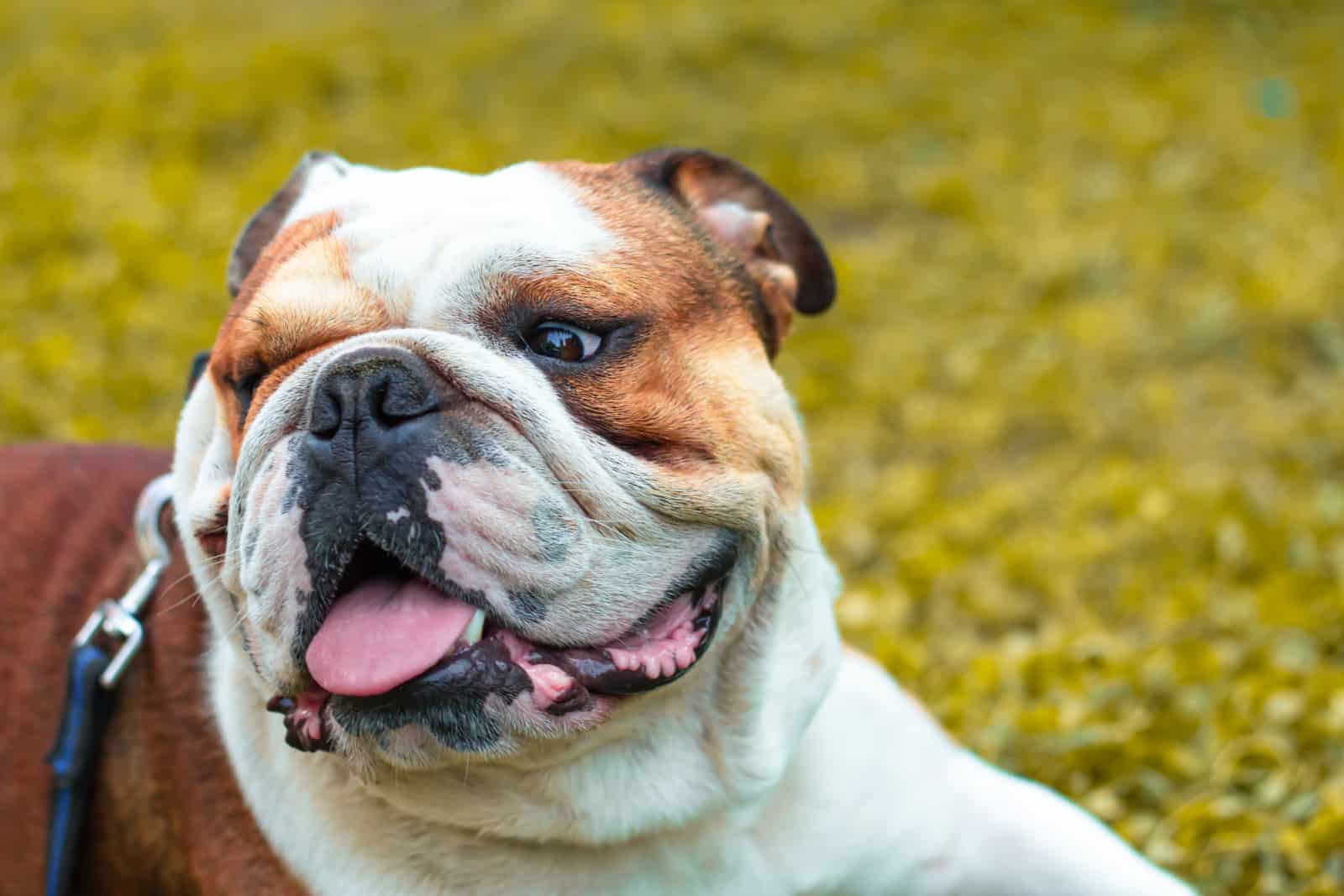
People with Down syndrome are very easy to recognize, and this syndrome can be diagnosed even before the child is born. But, what about dogs? Can dogs really suffer from Down syndrome?
Humans and dogs differ in the number of chromosomes – while humans have 23 pairs of chromosomes, dogs have 39.
Dogs cannot have Down syndrome like humans, since this syndrome represents the presence of 47 chromosomes in humans (1 extra copy of chromosome, or a partial copy of chromosome), and dogs have a total of 78 chromosomes.
Therefore, dogs cannot have Down syndrome in the way that this syndrome manifests itself in humans.
However, our furry friends can have certain genetic abnormalities, which by their characteristics remind us of the symptoms of Down syndrome in humans.
Further on in the text, we will describe what health problems dogs can have, and which can remind us of Down’s syndrome.
What Is Down Syndrome?
We will briefly explain what Down syndrome actually is.
Down’s syndrome is a chromosomal disorder that occurs due to an excess of one chromosome or part of a chromosome in the nucleus of each body cell.
Down syndrome can appear in any family, regardless of the health of the parents or their lifestyle.
There are a large number of cells in the human body, each of which has a nucleus in which the hereditary material is located, that is, genes that are grouped around chromosomes.
The nucleus of each cell in healthy people has 23 pairs, that is a total of 46 chromosomes. Down’s syndrome causes the wrong transfer of chromosomes, so that the cells do not contain 46 chromosomes as they should, but 47.
It is believed that women over the age of 35 are more likely to give birth to a child with Down syndrome.
This syndrome is recognizable by the characteristic physical features of the child, such as a wide neck, slanted eyes, round face, short hands, small mouth and disproportionately large tongue.
Children with Down syndrome need constant attention, physical therapy, and counseling throughout their lives.
People with Down syndrome are also more prone to the development of some other health issues, such as congenital heart disease, thyroid problems, problems with the digestive system, and leukemia.
What Are The Symptoms Of Down Syndrome In Dogs?
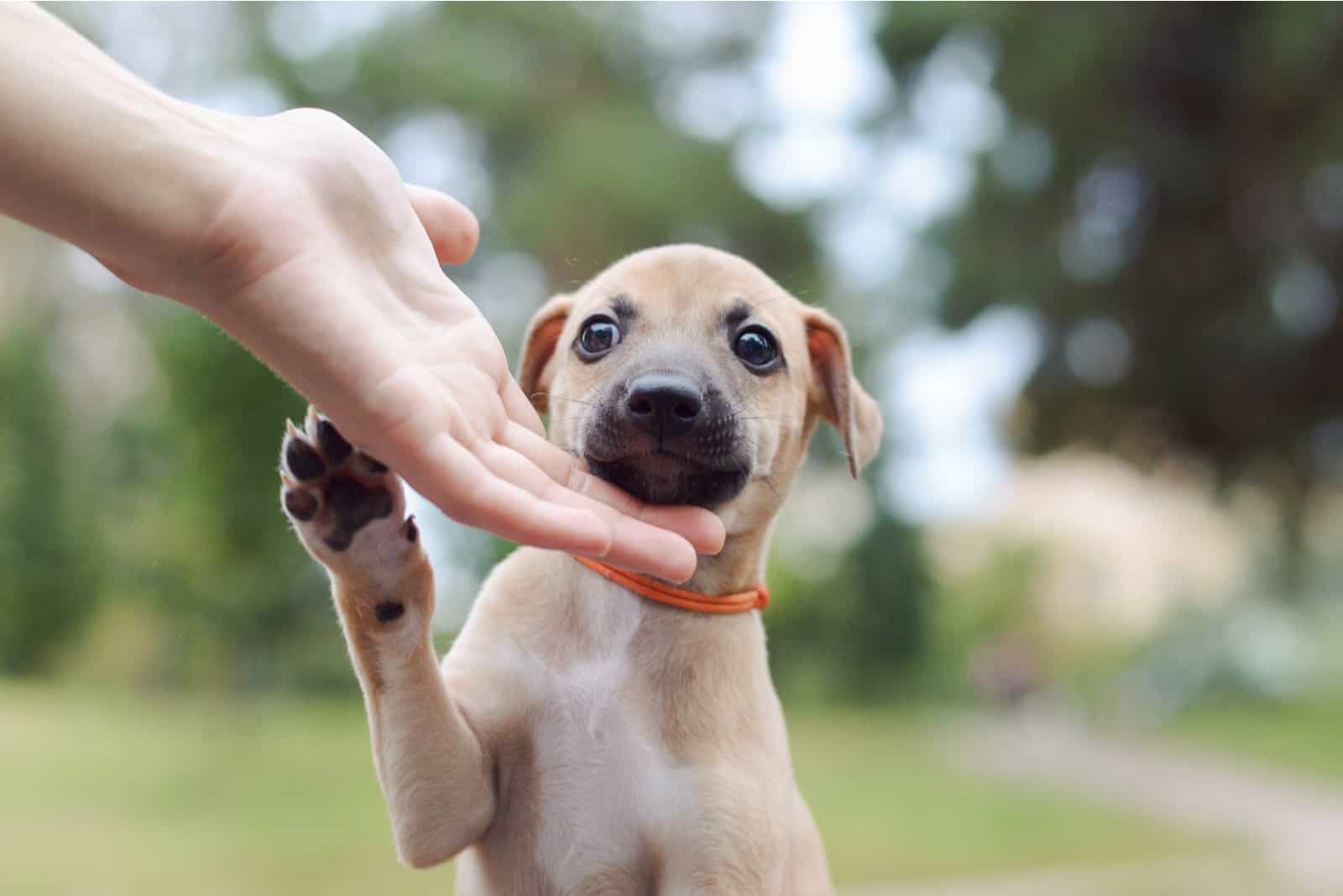
So, there is no scientific evidence that dogs can have Down syndrome – no dog has ever been diagnosed with this syndrome. This is due to the fact that dogs and humans have different genetic material, so they cannot be diagnosed with the same genetic disorder.
Still, although there are not many researchers in the field of genetic disorders in dogs, this does not mean that they do not exist. So, if you have wondered Can dogs be retarded?, the answer is – yes, they can.
Also, there are some symptoms that we can recognize as symptoms of Down syndrome in our canine friends.
Let’s look at them.
1. Atypical Facial Features
Each dog breed has something that makes them special and interesting. If you intend to bring a new pet into your home, you have certainly researched everything related to the breed standard, so you know exactly what to expect from the appearance of your future dog.
If they notice that their dog has a different eye shape, different ears, lips, or a head shape that is not in accordance with the standard of the breed, many people will think that their dog has Down syndrome.
Although in many cases this does not have to be a sign of any health problem, it is always good to check with the veterinarian why the dog has abnormal facial features.
2. Stunted Growth
You have dreamed of welcoming a wonderful German Shepherd into your home for many years, and now your wish is about to become reality!
One thing you have certainly checked is the German Shepherd growth chart, to see how big your dog will grow up to be.
As the time passes, you start to notice some deviations from your dog’s size and the recommended size for the puppy’s age.
Since stunted growth is also a symptom of Down syndrome in people, you start to worry. Will your dog ever grow up to the normal size for its breed?
There are many reasons for stunted growth in dogs. Maybe your dog lacks something in its daily routine, so, before you diagnose your dog with Down syndrome, or any other health issue, you should consult your veterinarian.
3. Bad Vision
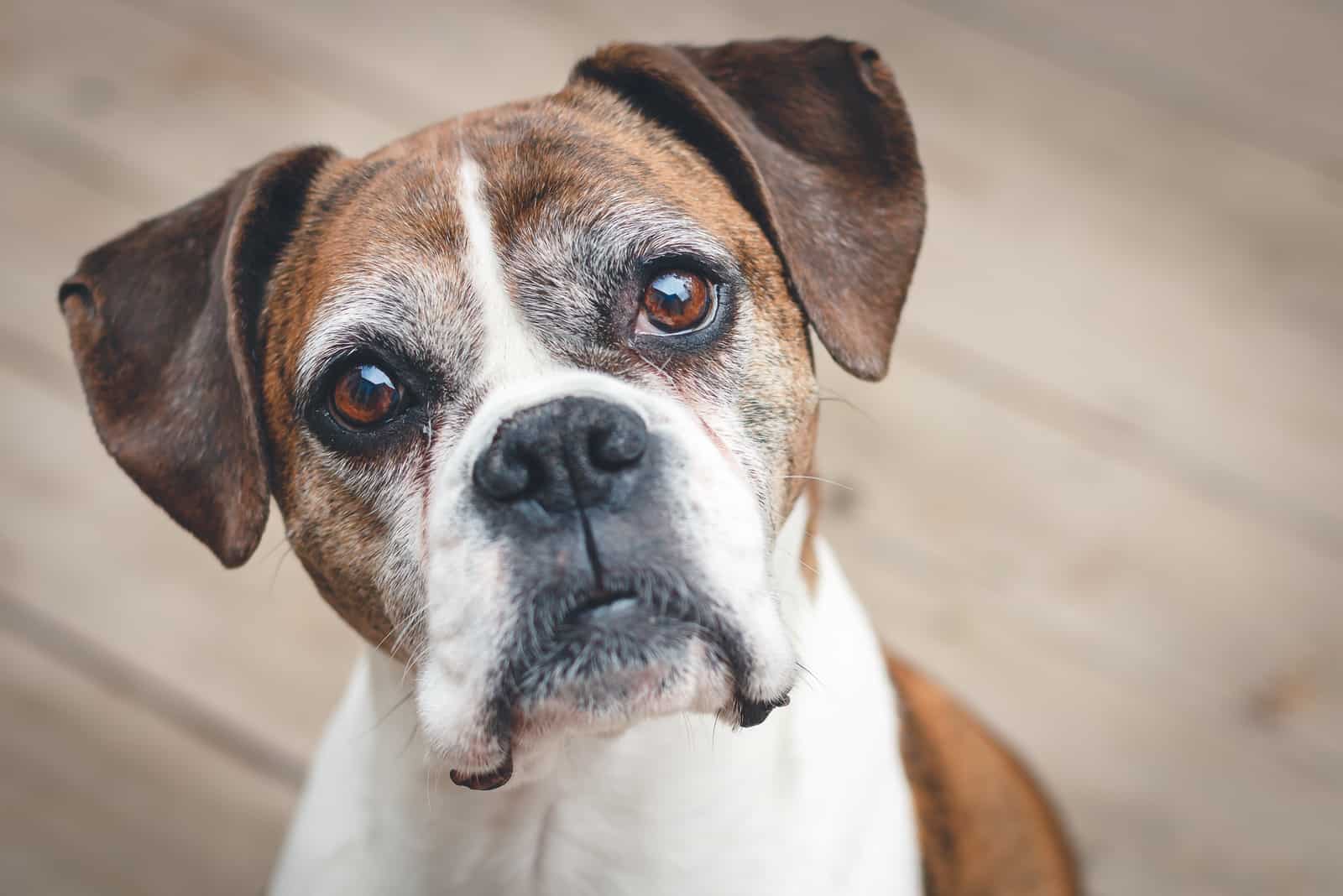
Many dogs suffer from eye infections, and this is something that a vet can treat, but, when pet owners notice that their dogs have a very bad vision, most of them will instantly get worried.
Moreover, if your dog has misshapen eyes, and a vision impairment problem, you might even think that your dog might have Down syndrome.
As we have already mentioned, dogs cannot be diagnosed with Down syndrome. However, poor eyesight can be a sign of other mental disorders, so it would be best to consult your veterinarian on your dog’s symptoms.
4. Bad Hearing
Together with bad vision, some dogs might experience bad hearing. Some dogs that have the merle gene, like the green-eyed dogs might be prone to total hearing loss.
Many breeders will produce dogs with rare coat colors, or smaller versions of big dogs since they will look even cuter, and they will be able to sell them for more money.
It is clear that this is totally wrong, since many of these dogs develop certain health issues that significantly affect their quality of life.
Reputable breeders will only breed two completely healthy dogs so that their offspring will also be genetic disorders-free.
5. Breathing Issues
Some dogs will experience breathing issues, and this is especially related to the brachycephalic dog breeds.
These are dogs with short muzzles, which in addition may have a cleft palate on the upper part of the lips which can cause the trachea to comb.
Also, in some of these dogs, the trachea is significantly longer than usual, and if the dog is obese, this problem might become more severe.
In addition, brachycephalic dogs can also have compressed nostrils, which limit the flow of air and make breathing significantly more difficult for the dog. The most popular brachycephalic dogs are Bulldogs, Pugs, Boston Terriers, Shih Tzus and Boxers.
All dog owners should know that these dog breeds are more prone to breathing problems and heat stroke. In some cases, this can significantly affect their lifespan.
Many people associate breathing problems in dogs with symptoms of Down syndrome.
6. Skin Issues
Some dogs can have allergies, hair loss problems, or and other health conditions related to skin. Some dog breeds are more prone to these problems, while some live in certain environmental conditions that favor the development of such problems.
Although skin issues in dogs are not related to chromosomes or certain genetic conditions, many people will connect dog’s skin problems with Down syndrome symptoms.
Your dog’s skin issues are probably not a symptom of some genetic disorder, however, if you notice any change in your dog’s skin or fur, you should not ignore this – you should take your pooch to the vet for an examination.
7. Puppy Has Problems With Learning
Welcoming a new dog is so exciting! You probably can’t wait to start sharing a daily routine with your dog and are already slowly shaping your puppy’s schedule. Exercising, training, sleeping, eating – all this should be part of the daily routine of every dog.
I am sure that most of all you look forward to the moments when you will teach your dog his first commands.
Every dog owner is indescribably happy when his dog begins to respond to training methods, and when he slowly begins to master an increasing number of commands.
However, it seems that your dog is significantly slow – that is, the dog has a problem with mastering basic commands.
Days pass slowly, and you are still in the same place. Now you are getting a little worried and wondering if it is possible that your dog has learning difficulties.
People with Down syndrome do not learn in the same way as healthy people, therefore, many dog owners will take their pet’s inability to successfully master basic commands as a symptom of Down syndrome.
It is true that the inability to learn commands can be one of the signs of mental disorders in dogs, but – we note again – there is no evidence that dogs can have Down syndrome.
8. Aggressive Behavior
All dogs should be trained and socialized from a young age – this way, we will significantly decrease the possibility for our dogs to show aggression signs.
According to some opinions, this behavioral problem in dogs can also be a sign of mental disorder. Today we have dog trainers that are able to make even the most stubborn dogs become well-behaved dogs.
However, if nothing seems to be working for your dog, there might be something more than a simple behavioral problem.
What Are Some Health Issues In Dogs That Remind Us Of Down?
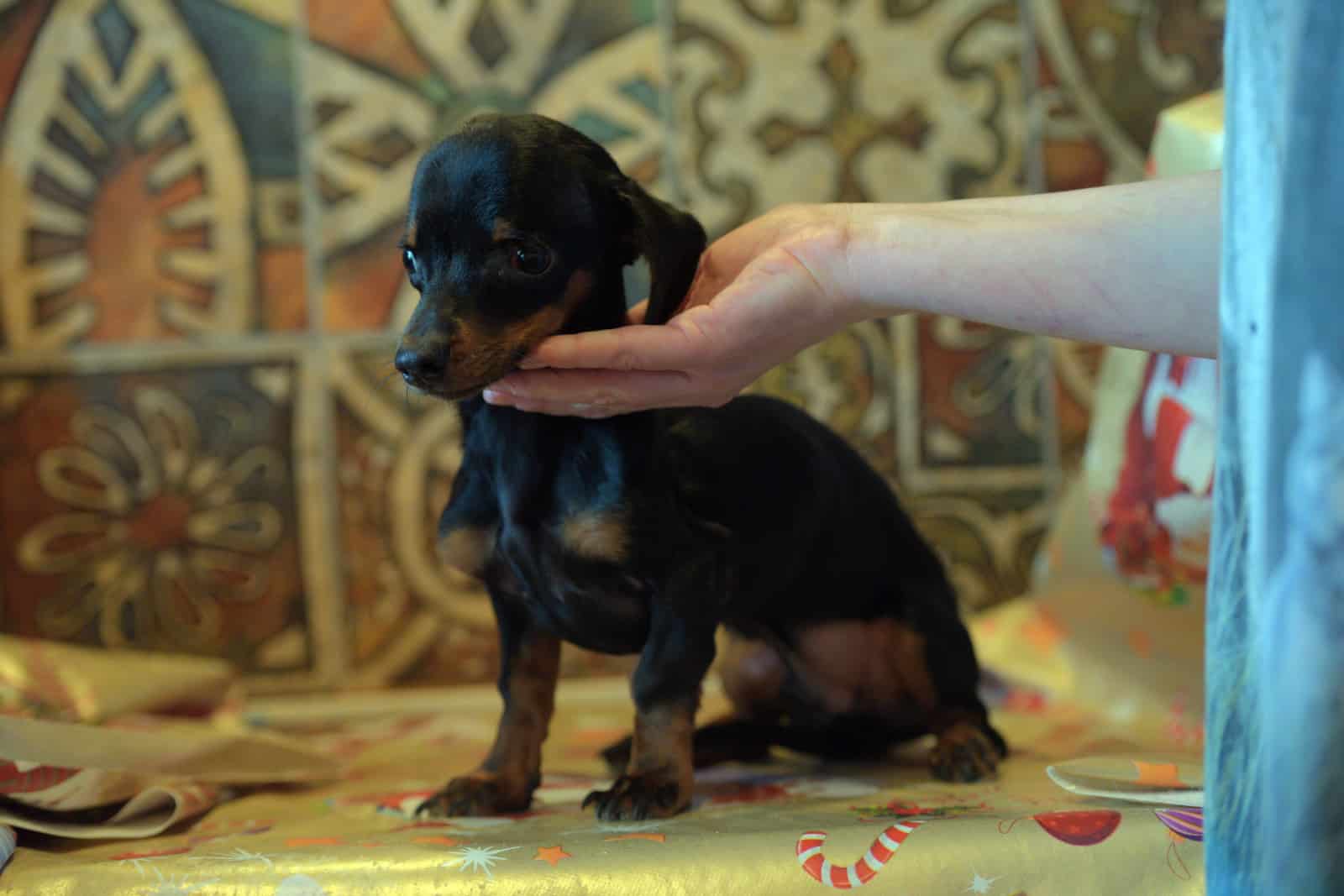
We don’t have any scientific confirmation that our canine friends can have Down syndrome, but there are still certain genetic disorder dogs due to which we can characterize some dogs as special needs dogs.
So, these dogs will not be able to do things on their own like other dogs. Also, they will probably have physical characteristics that will make them different from other dogs of the same breed.
Now, let’s see what are those diseases that might look like Down syndrome in dogs.
1. Congenital Hydrocephalus
Even if you are not too familiar with the health of dogs, I believe you can guess how important the brain is for a dog’s life – the same as for a human’s life. Congenital hydrocephalus is a medical condition that can be fatal for a dog’s life.
This condition represents the accumulation of fluid in the dog’s brain membranes, which leads to serious consequences, such as frequent seizures in the dog.
Congenital hydrocephalus is more common in small dogs, such as Yorkie Terriers and Chihuahuas. Some of the symptoms of this condition in dogs are as follows:
• The dog spins in a circle without being aware of how long it has been doing this
• The dog does not notice the events in its environment
• The dog throws its head to the side while walking
• The dog can be either indifferent or aggressive
• The dog may have frequent seizures
• The dog cannot see well and loses coordination of body movements
• The dog is a slow learner
It is very important that this disease is detected on time, and one of the more curative methods is the use of drugs that can reduce intracranial pressure. If the disease is advanced, surgery will be required.
2. Pituitary Dwarfism
Pituitary dwarfism in dogs is a manifestation of pituitary hormone deficiency, and is characterized by growth hormone deficiency. In dogs with this type of dwarfism, growth retardation with some additional symptoms is noticeable.
This condition can be inherited, therefore, if one of the parents has a deformed gene, it can pass it on to its puppies.
In addition to genetics, pituitary dwarfism can also occur if the pituitary gland in a dog does not develop normally, or if it is damaged by the appearance of cysts or tumors.
Pituitary dwarfism in dogs is manifested by the following symptoms:
• Short limbs
• Baby teeth in dogs do not fall out in the period when it is expected
• Hyperpigmentation of the dog’s skin
• Loss of hair
• Dog sterility; testicular atrophy is also possible in male dogs
• Aggressive behavior of the dog
• Heart problems
In order to determine if your dog has pituitary dwarfism, the veterinarian will need to check the growth hormones in the dog’s blood.
This syndrome can be treated by giving the dog growth hormone injections, and there is also a possibility that the dog’s thyroid will malfunction.
German Shepherds, Spitz dog breeds, and Weimaraners are at higher risk to suffer from pituitary dwarfism.
Dogs with this diagnosis have a significantly shortened lifespan.
3. Congenital Hypothyroidism
Hypothyroidism in dogs is a fairly common endocrine disease, and it implies a long-term lack of canine hormones.
The thyroid gland is an important organ in the dog’s body that secretes vital hormones: triiodothyronine (T3) and thyroxine (T4). These hormones are responsible for regulating all metabolic processes in the dog’s body.
Thyroid hormone is secreted in the pituitary gland and it activates the thyroid gland. Hypothyroidism develops when any of the metabolic processes in the dog’s body are impaired. Hypothyroidism in dogs can be primary, secondary, tertiary, and congenital.
Congenital hypothyroidism occurs as a result of damage to the pituitary gland or malformation of the thyroid gland, and is noticeable by the dwarfism and stunted growth of the dog.
Although all dogs can get this disease, it is most common in middle-aged or older dogs.
The most common symptoms of hypothyroidism in dogs are as follows:
• Dog obesity
• Loss of hair
• Expressive lethargy of the dog
• Constipation or diarrhea
• Eye problems
• Poor muscle tone
Hypothyroidism in dogs is treated by replacing the thyroid hormone with drugs, and sick dogs have to take the therapy for the rest of their lives.
4. Portosystemic Shunt
Portosystemic shunt in dogs is a vascular deformity that causes toxins to circulate in the dog’s body. A shunt in dogs is a vessel located between the portal vein and the caudal vena cava.
The portal vein filters the blood that passes from the intestine to the dog’s liver to rid it of toxins.
The purified blood then passes through the caudal vena cava towards the heart, and the heart then sends it to the entire body.
Portosystemic shunt refers to a condition when the blood does not pass through the liver, that is, when the blood is not purified, and then various toxins are transferred through the blood to the dog’s body.
The main symptoms of portosystemic shunt in dogs are as follows:
• A sick puppy will be significantly smaller than other puppies in its litter
• Dogs often urinates a lot, or urinates too little with great difficulty
• Dogs often tremble
• Decreased appetite of the dog
• Blood in the stool
• Neurological deficit
• Behavioral problems
In order to cure a congenital portosystemic shunt in a dog, it is necessary to surgically implant an ameroid constrictor ring. After surgery, veterinarians prescribe an adapted diet for the dog, which is usually based on reduced protein intake.
Some dog breeds that are prone to developing this health condition are Shih Tzus, Yorkshire Terriers, Dachshunds, Australian Shepherds, Golden Retrievers, and Labrador Retrievers.
What Causes A Dog To Be Born With Disabilities?

There is no way we can influence whether a child will be born with Down syndrome or any other mental disorder. Such diseases occur in families of all races, economic conditions, and in all countries of the world.
It’s the same with dogs – there’s no way to predict if one of the puppies from a litter will be mentally challenged.
However, there are some breeds that are more susceptible to disorders such as pituitary dwarfism or Congenital Hydrocephalus, but – this does not mean that other dog species cannot suffer from such disorders.
So, we can say that this is simply a matter of destiny and something that we cannot influence.
What we can certainly do is to prevent dogs with mental disabilities from reproducing further, since there is a much greater possibility that they will pass their disease on to their offspring.
It is also important to note here that some breeders often mate dogs with certain defects.
For example, a Husky breeder saw that the Husky is a popular dog, and that it would sell even better if it were a little smaller, since many people live in small apartments and there is not much space for larger dogs.
So, that breeder came up with the idea of breeding miniature Huskies. How does he do it? In such a way that the smallest dog from the litter – a runt – is mated with another Husky.
Or, many breeders will mate a purebred Husky with another, smaller dog breed, so that their offspring will be smaller than the standard Husky.
Today, many breeders sell miniature versions of popular dogs, but we hope you understand that these practices are highly undesirable. Let’s not forget how many health problems such dogs can have – from stunted development, congenital diseases, and so on.
How To Take Care Of A Dog With Special Needs?
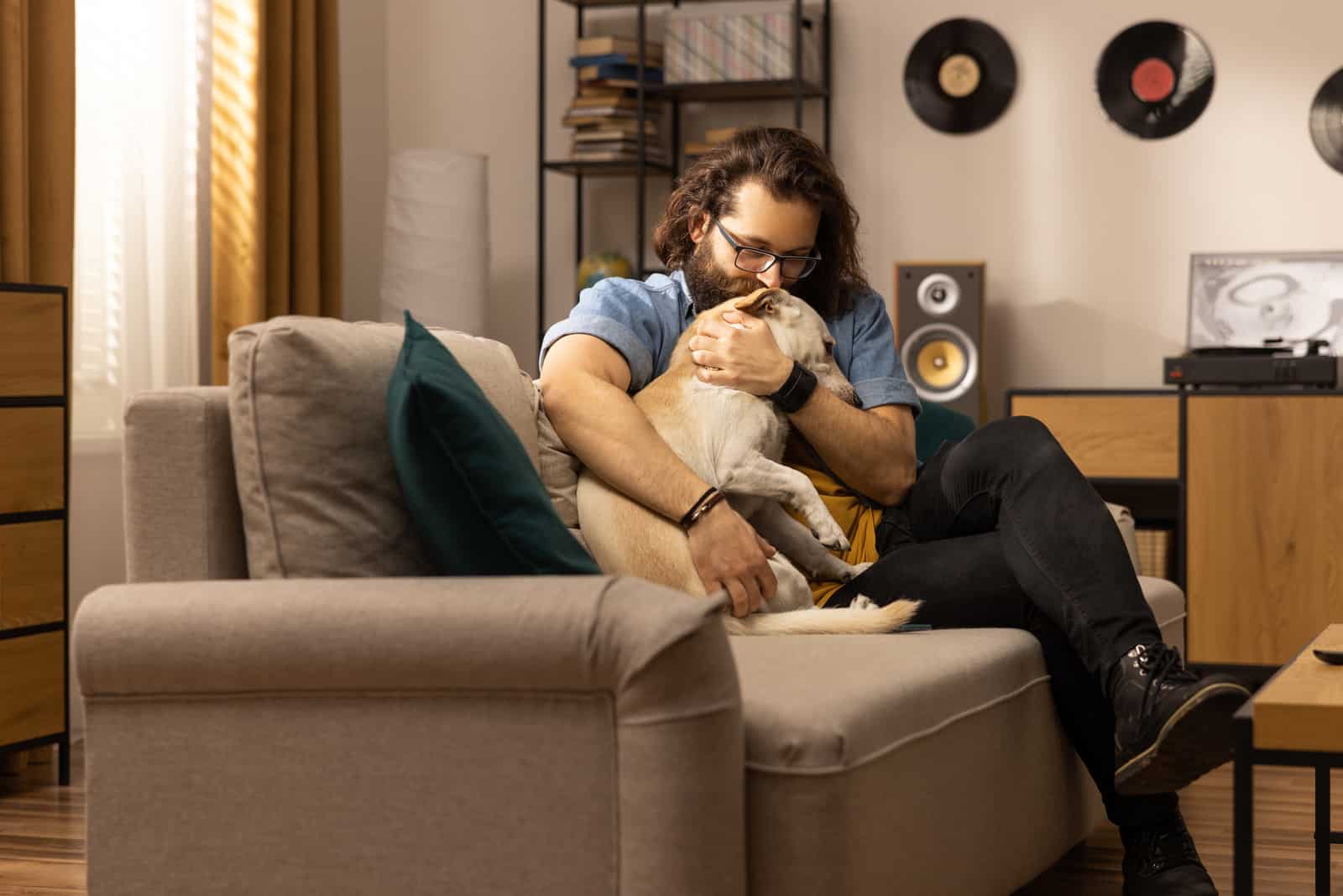
There is no cure for mental disorders in people, as well in dogs. As hard as it will sound at the beginning for any dog owner, dogs with special needs still can be wonderful pets that will show you a special kind of love and friendship.
The truth is it will not be easy to take care of a dog that has difficulties with learning and a dog that perhaps will not be able to be left alone for any longer periods of time. However, every dog deserves attention and adequate care.
So, if your vet confirms your dog has a certain mental disorder, do not feel helpless right away. Instead of that, read some pieces of advice on how to take care of a dog with special needs.
Nutrition Is Essential
A balanced and regular diet is important for the health and quality of life of every dog. This especially applies to dogs with special needs, whose life expectancy is much shorter anyway.
Dogs with mental disorders are recommended to be given food that is quite rich in protein, so that their muscles are stronger and the dog is as mobile as possible.
For dogs with special needs, raw food is very good, providing them with nutrients and at the same time rebuilding their muscles. Read more about how much raw food a puppy should eat.
It is also very important that the owners make sure their dog is not allergic to any food ingredient. Since dogs with mental disabilities are more prone to other health problems, many of them can develop allergic reactions to various environmental allergens.
If you are not sure how to choose the best dog food for your pet, it would be best to consult a veterinarian.
Make Your Home As Comfortable As Possible
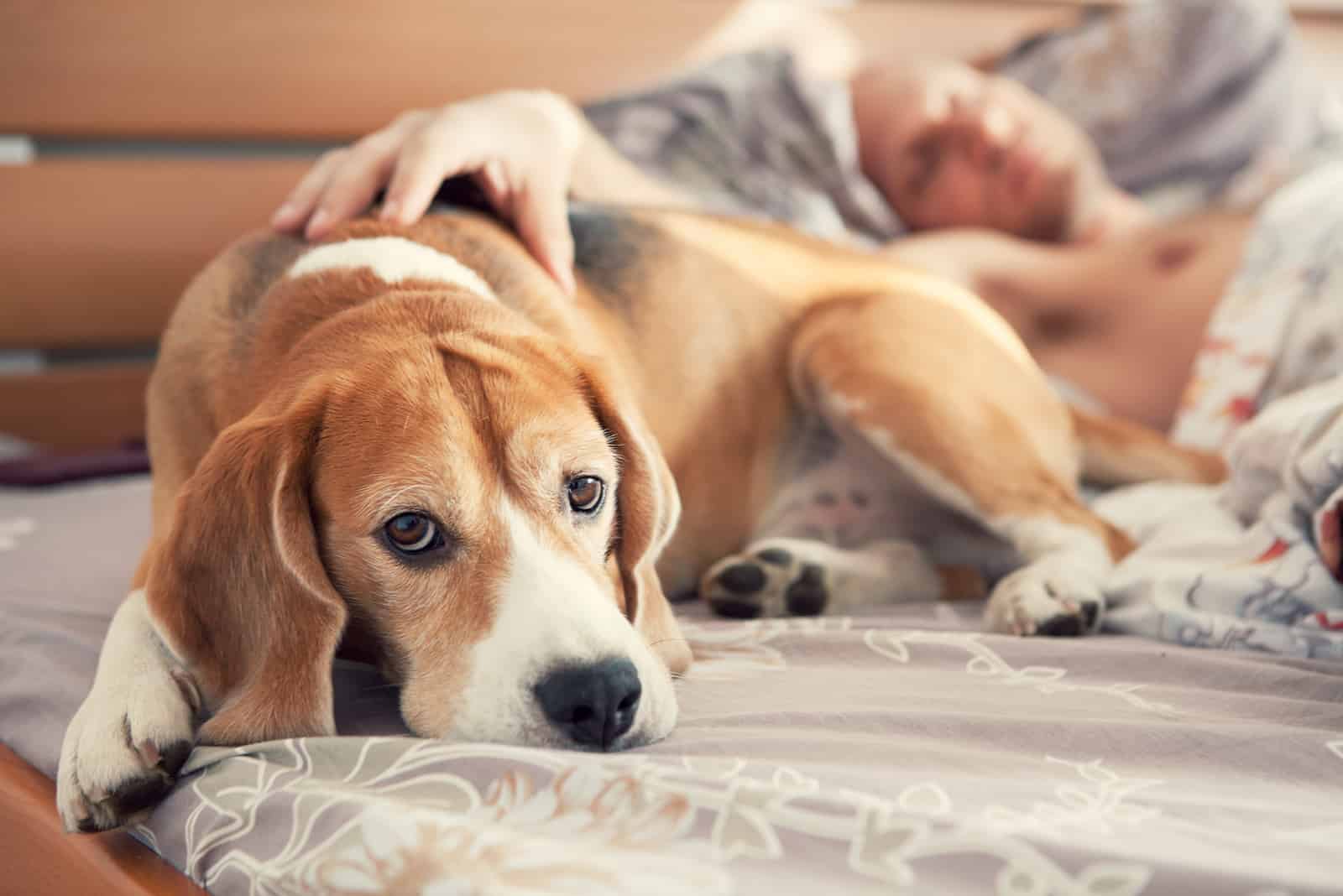
Dogs with special needs will have a harder time learning and moving around than healthy dogs. Therefore, it is important that your home is adapted to the needs of your dog.
If your dog’s vision is impaired, it would be best if you remove unnecessary things from your home that could make it difficult for your dog to move.
Also, it could be quite difficult for a dog to use the stairs, so if you have stairs inside your house, it would be best if the bed and food and water bowls for your dog are on the ground floor of the house.
In this way, the dog will not have to struggle with constantly going up and down the stairs.
If you notice that anything else is disrupting your pet’s daily functioning, consider whether there is any way to change it.
It is very important that a dog with special needs feels comfortable and pleasant in your home, and that, as much as possible, it leads a normal life.
Find The Ideal Balance For Exercise
Physical development of a dog with special needs will significantly differ from a healthy dog’s one. You will notice this very quickly as your dog grows up, who will probably be significantly slower to run, walk, and play with toys than other dogs.
So, do dogs with special needs need exercise at all? Oh yes, definitely! Exercise is very important for their health; no dog should ever go without exercise, unless, of course, the vet recommends it.
You should definitely walk your dog as often as possible, and how often you walk him will depend significantly on his physical condition and his ability to withstand physical activity.
In any case, physical activity in any form should be part of your dog’s daily routine.
Of course, you should consult with your veterinarian about which form of physical activity would be best for your dog. You certainly don’t want to exhaust him too much or further damage his health.
It Is Good For A Dog To Have Company

If you have children, you were probably extra worried when you found out that your dog has a mental disorder. Should children spend time with a dog? Is it safe to leave children alone with a dog?
Here we encourage you not to worry, since dogs with special needs express love in a special way and form strong and deep bonds with people, especially with children.
There is a great possibility that these dogs will show extra love and affection to children. In any case, we do not recommend leaving any dog alone with children without supervision, especially if they are very young children.
For dogs with special needs, it is positive and beneficial to have the company of both people and other dogs.
Just because a dog has stunted growth and learning difficulties doesn’t mean it should be isolated and left to live alone. After all, there is no possibility of a dog passing its disease on to other dogs!
Of course, we certainly do not recommend that a dog with mental disabilities mates. Many of these dogs have problems with fertility anyway, and if one parent has a certain mental problem, there is a high possibility that its offspring will inherit the same.
Therefore, if you would like your dog with special needs to have company, make sure that the other dog is of the same sex, or that it is neutered so that the dogs can socialize without you having to worry.
Dog’s Surroundings Should Always Be Clean
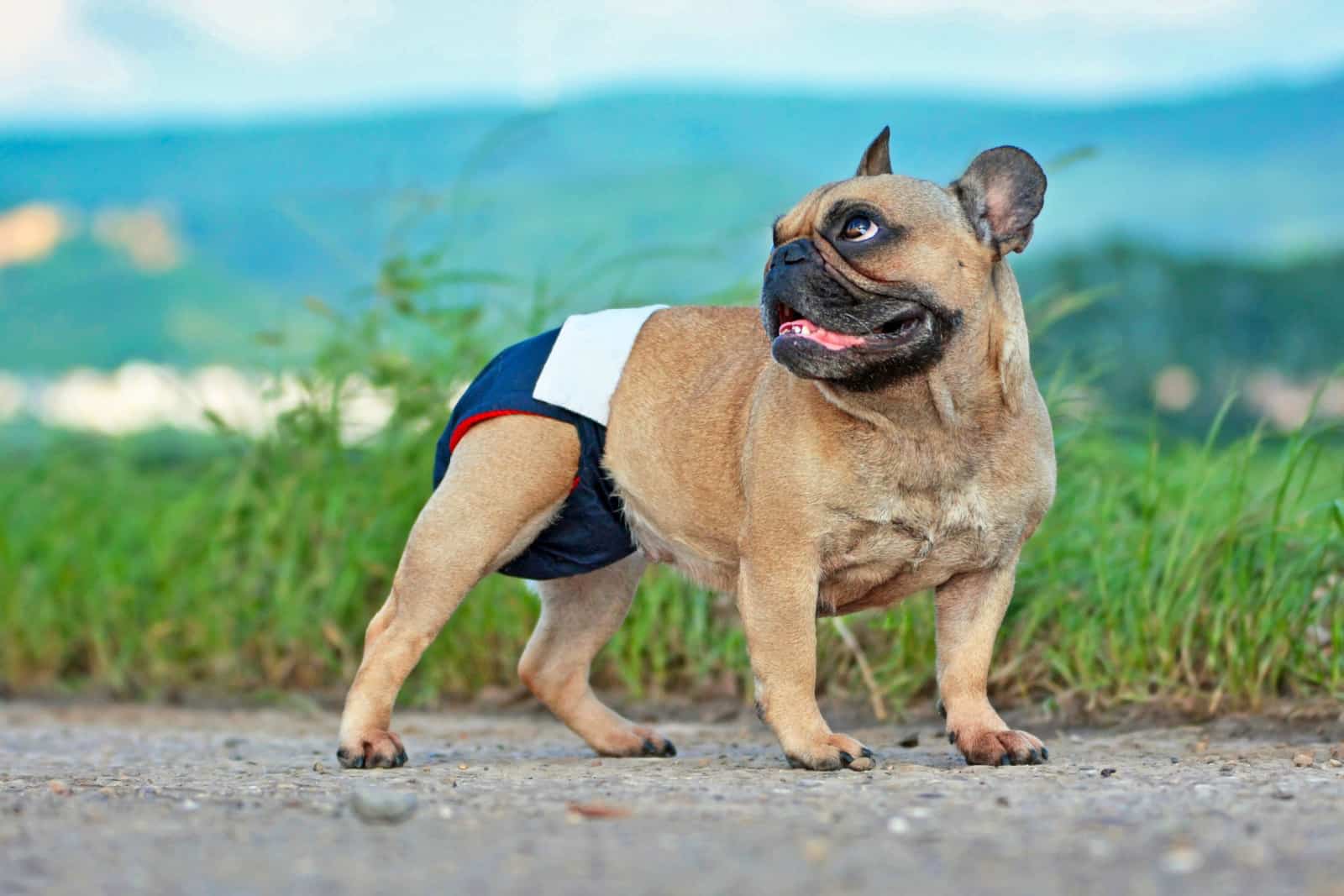
Potty training could be quite demanding with dogs with special needs, so there is a high possibility that you will often encounter dog poop inside the house.
Such accidents are common with small puppies that are just learning to defecate, but with dogs with special needs, it is possible for these habits to continue even when the dog grows up.
Here, it would be useful to use puppy diapers, which can significantly ease your life with a dog that has problems defecating.
Also, with dogs with mental disorders, it is necessary to emphasize the importance of constant hygiene and keeping the dog’s living space clean.
Since frequent potty accidents are possible, this is the first reason why you’ll need to clean often. In addition, it is important that the dog’s bed, toys, blanket, and bowls with food and water are always clean.
Do not forget that these dogs are more susceptible to infections and viruses and that it is very important that their space is always clean of bacteria and fungi.
Regular Vet Visits
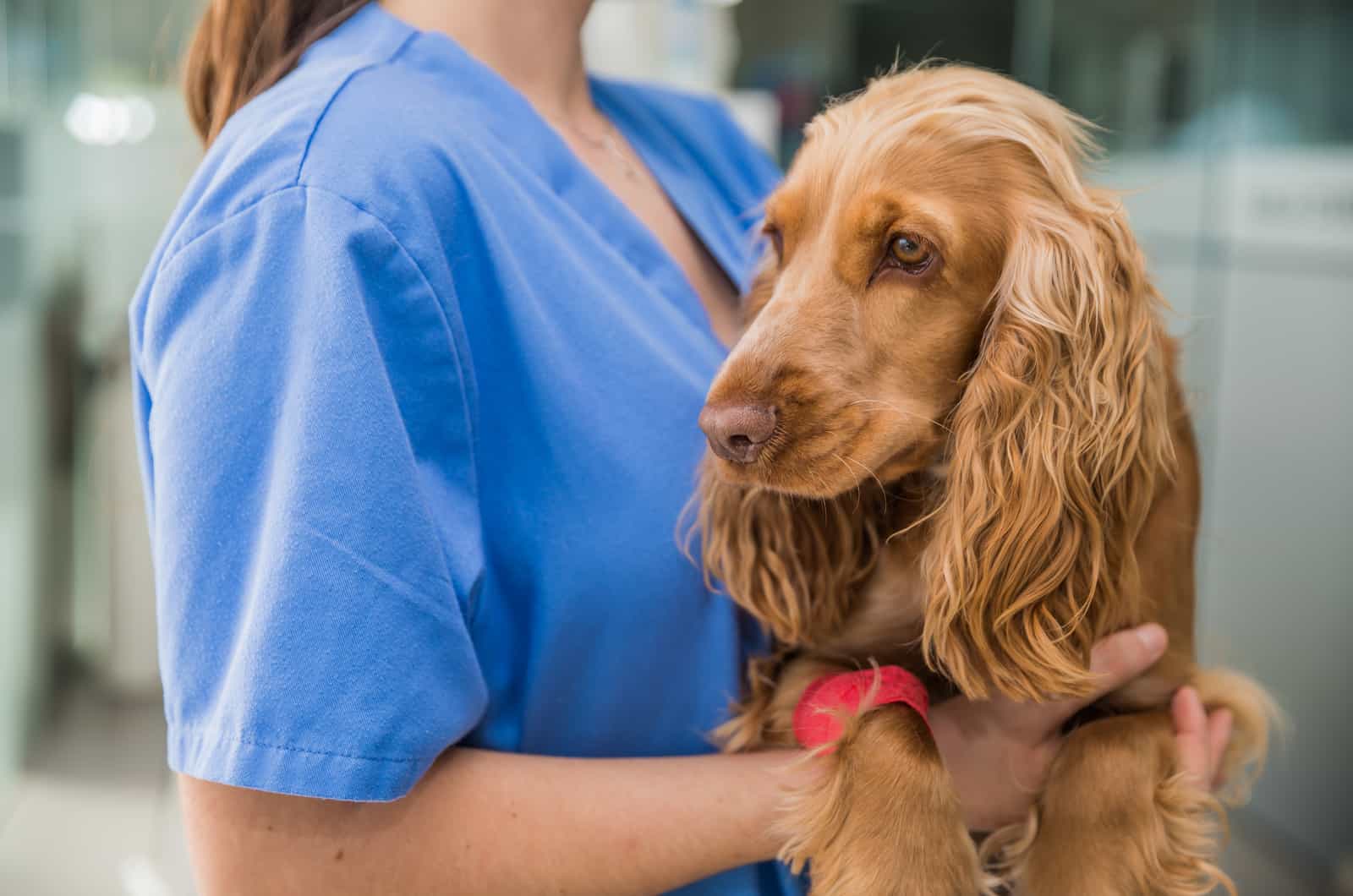
Regular visits to the vet are important for the health and longevity of any dog, and are especially important for dogs with special needs.
We have to be honest and say that there is a high possibility that with a dog like this you will visit the vet much more often.
In addition, dogs with special needs can have various additional problems, such thyroid issues, problems with the heart, or with the kidneys. You will most likely need to allocate a lot of money for medicine and care for a dog with special needs.
However, with regular visits to the vet and following the vet’s advice, you will enable your puppy to live a quality life.
Although often all this will be demanding, it is a wonderful feeling to help someone who needs help, especially when it comes to our furry companions.
Also, with dogs with special needs, it is good for all owners to consider having pet health insurance.
Nothing Without Patience
We have to be honest and face the fact that caring for a dog with special needs is definitely not easy. Some days you will want to give up because it will all be too hard for you.
However, we believe that it is wonderful and noble to help those in need, so, even in difficult moments something positive can be found.
So, in caring for a dog with special needs, it is very important that you have a lot of patience and understanding.
Also, it is good to give yourself a break and a day just for yourself, when you can ask one of your family members to take care of the dog.
Every dog is different, and diseases do not affect everyone the same; there is a great possibility that dogs with mental disabilities can master certain training and live a normal life, as far as possible.
Therefore, do not be discouraged if the veterinarian confirms the diagnosis in your dog. Although everything can seem scary at first, with love and patience everything is possible. And with just one look at the grateful eyes of your furry friend, you will be convinced that every sacrifice is worth it!
FAQs

Can An Animal Have Down Syndrome?
Animals cannot have Down syndrome. Humans and animals do not have the same number of chromosomes, therefore, the disorder in the number of chromosomes in humans characterized as
Down syndrome cannot be found in the same way in animals.
It is true that there is not a large number of genetic testing on animals, therefore, we still do not have a good enough insight into these and similar syndromes in dogs and other animals.
However, we can say with certainty that in animals it is possible to notice certain symptoms that remind us of the symptoms of Down syndrome in humans, such as stunted growth, atypical facial features, short limbs, and so on.
Can Dogs Have Disabilities?
Dogs can have disabilities. Some dogs are born with a birth defect that can cause them to learn more slowly, understand less, have difficulty moving, and exhibit some other unusual behaviors.
Dogs with disabilities will need more frequent veterinary appointments and are more susceptible to developing other medical conditions.
However, with appropriate living conditions, quality care, and regular visits to the vet, these dogs also have a great chance for a quality and long life.
What Is The Treatment For Down Syndrome?
Dogs cannot have Down syndrome, therefore, there is no treatment for this disease in dogs. If we characterize some other mental disorders in dogs as Down’s syndrome because of similar symptoms, then we can talk about a specific treatment.
However, there is no complete cure for such diseases. Of course, everything will depend on how pronounced the disease is in the dog and to what extent it impairs its normal functioning.
After a thorough examination, the veterinarian will determine exactly which mental disorder the dog is suffering from. After that, he will advise on the best treatment, that is, the way in which the dog can function normally.
In some cases, lifelong therapy in the form of appropriate drugs will be necessary, and in other some cases, the veterinarian will recommend surgery.
Final Words
So, the answer to the question: Can dogs have down syndrome? would be no, they can’t. There is no proof of chromosomal abnormalities in dogs in the same way they appear in humans.
Still, dogs might have some mental disorders whose symptoms might remind us of Down syndrome, such as a broad head, short limbs, and stunted growth.
As we have seen, there are also various diseases in dogs that can make some dog owners think that their dog may have Down syndrome.
If the veterinarian determines that your dog really has a certain disease, either inherited or acquired during life, it is crucial that you provide your pet with appropriate help and care.
This does not only mean giving medicine, but also showing patience and encouragement to our furry friends. In no case should a sick dog be left to its own devices, but at this very moment it should receive as much love and caress as possible.
We hope that you found all the answers to your questions and that you take care of your dog’s regular veterinary examinations!
